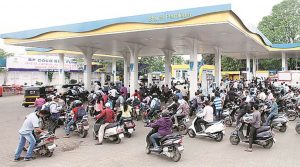$100 Website Offer
Get your personal website + domain for just $100.
Limited Time Offer!
Claim Your Website NowHow first cut in fuel prices in a year could strain finances

Source-indianexpress.com
A cut in excise duty on petroleum products will put a strain in central government finances unless it is followed by a commensurate reduction in expenditure. Reducing government spend when growth rates are just about firming up is not on Finance Minister Arun Jaitley’s mind, but tax collections so far do present a challenge in meeting the targets for this financial year.
Any decision that adversely impacts the government’s efforts in fiscal consolidation may not be viewed favourably by the market and rating agencies. In the last four years, the government did not cut fuel prices — except once in October 2017 — despite rising costs of crude oil imports, taking full benefit of higher excise collections. In many ways, it helped Jaitley rein in the fiscal deficit, which stood at 4.4% of GDP in March-end 2014 when the NDA government took charge.
In 2016-17, the fiscal deficit was 3.5% of GDP, and remained stubborn at the same level in 2017-18 as well. In the current financial year, Jaitley is confident it would be down to 3.3% of GDP, which will be a tough act to accomplish. In November 2017, while upgrading the government’s bond rating to Baa2 from Baa3, credit rating agency Moody’s had said, “A material deterioration in fiscal metrics and the outlook for general government fiscal consolidation would put negative pressure on the rating. The rating could also face downward pressure if the health of the banking system deteriorated significantly or external vulnerability increased sharply.”
All three aspects of Moody’s warnings are at play now. Average monthly GST collections have been short of the Rs 1 lakh crore target over the last five months, and net direct tax collections in the first half of the current financial year is less than 40% of the annual target. The NPAs have risen, and have probably peaked, but the external sector poses its own set of problems with rupee having depreciated sharply by over 13% in calendar 2018.
On top of the excise duty cut, which will cost the exchequer Rs 21,000 crore in a full year, the government has asked oil marketing companies to share a burden of Re 1 per litre of fuel, which will result in under-recoveries. Thursday’s move is probably the first step in the path of the burden sharing formula put in place by the UPA government when petroleum product prices were regulated — a third of the burden to be borne each by the government, oil marketing companies and the consumers.
Analysts said Rs 10,500 crore of fall in revenues from lower duties on fuels in 2018-19 could raise concerns among foreign portfolio investors. While rising global crude oil prices are leading to twin-deficit challenge of fiscal and current account deficit, the relentless fall in rupee is not helping either. With the cushion of low global oil prices, which significantly helped in improving India’s macro-economic numbers in the last four years, fast disappearing, the economy will be facing several uncertainties in medium term, they said.
Not all analysts are as worried. “It (tax cut) is not populism. Even though it will lead to some fiscal outgo, but now the burden will be shared by the government and oil companies. And the fiscal impact will be very very marginal,” State Bank of India’s Group Chief Economic Adviser Soumya Kanti Ghosh told The Indian Express. To stabilise the rupee, the Reserve Bank of India is now expected to announce short-term measures — such as denominating the oil imports from Iran in rupees and opening dedicated dollar swap window for oil marketing companies, Ghosh said.
Market analysts said any step that reduces government revenue is a negative signal, especially for the bond market. Shares of oil marketing companies — HPCL, BPCL and IOC — fell up to 22.44 per cent Thursday as they have been asked to absorb Rs 1 per litre cut in fuel prices. “The price cut is credit negative for the PSU OMCs as this would impact their net marketing margins severely. At an industry level, this would lead to loss of margins of Rs 70-72 billion on auto fuel sales. Additionally, this would impact the morale of private fuel retailers who were aggressively expanding their retail network… the reversal of auto fuels price deregulation policy will hit the investor sentiment in the sector,” said K Ravichandran, Group Head & Senior VP, Corporate Ratings, ICRA Ltd.
The Centre, which has so far been fiercely protective of its fiscal turf and refrained from tax cuts, defended its Thursday decision as “perfectly good economics” and not a return to days of regulated oil prices. “This is perfectly good economics because we want consumers to spend on buying other materials also, rather than only spend on energy. And therefore, it is good economics also to increase the purchasing power of consumers, and to do it without impacting fiscal deficit is still good economics and reducing oil prices if you say is good politics, so be it,” Jaitley said Thursday. He said the impact of tax cuts “is only 0.05 per cent of the fiscal deficit” but the government will maintain 3.3 per cent target by March-end 2019 on higher tax collections.
Goods and Services Tax collections increased marginally to Rs 94,442 crore in September (for August) from Rs 93,960 crore in the previous month but below the monthly target of Rs 1 lakh crore. In April-September, the government collected Rs 5,77,970 crore from GST, or an average monthly collection of Rs 96,328 crore. While indirect taxes are below estimates so far, direct tax collections have been robust. In April-September, gross direct tax collections grew 16.7 per cent to Rs 5.47 lakh crore. The government is also behind its PSU state sale schedule, as it has realised Rs 9,219.91 crore so far as disinvestment proceeds against the target of Rs 80,000 crore for the full year, as per latest available date (as on July 5th) with Department of Investment and Public Asset Management.
C J George, managing director of Geojit Financial Services, said that investors may not turn take this cut in excise on petroleum products too negatively as of now. “They understand the electoral politics and know that government may have taken some decisions looking at electoral dynamics. However, if there are more such duty cuts by the central and state governments, it would lead to an outflow of funds by FPIs,” he said.
On the oil marketing companies absorbing part of price cuts, Jaitley said, “We are not going back on deregulation because the oil companies will still continue to factor in price on a regular basis. But the fact is we have to react to a situation where, if without impacting the fiscal deficit I can give relief and I have always said that our ability to give relief will not be at the cost of fiscal position, but when the fiscal position is able to absorb this.” Sharing of price cuts, though, will impact OMCs margins. The government full deregulated petrol prices in 2010 and diesel prices in 2014, linking them to global prices in order to ease its subsidy burden and improve earnings of OMCs.



